Sociology
| Curriculum Intent and Overview |
|---|
|
Sociology allows students to question the world they live in, encouraging students to become critical and analytical thinkers. Students are asked to query the many facets of society & investigate the impact class, gender, ethnicity, age, sexuality, nationality and disability can have on life chances in the current world. The scheme of learning is tailored to the needs of the students as well as aiming to always thrive for more. Students are actively encouraged to analyse, study & evaluate the world around them while nurturing an enthusiasm for a fairer world. |
|
|
The Department
Curriculum Leader: Miss Jennifer Lamb
Exam Board: AQA
Specification Number: 8192
What is Sociology?
Sociology is the study of society. At STAGS, Sociology is a popular subject choice, offered at both GCSE and A-Level. Sociology helps students develop a wide range of knowledge and understanding about society, including understanding of society's structures, processes and issues. Sociology is exciting, interesting and relevant to students' lives. It allows them to think critically about the world they live in and makes them analyse why things are the way they are.
Why study Sociology at St Albans Girls' school?
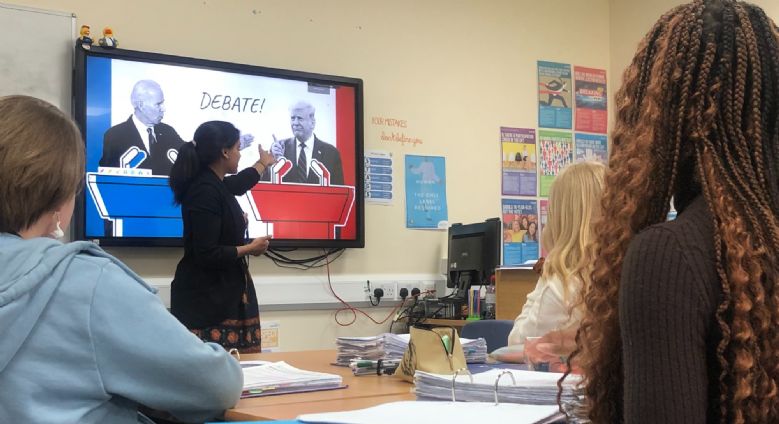 Every member of the Sociology department is a subject specialist. Staff have excellent knowledge of the subject and specification; this is aided by regular and ongoing continued professional development opportunities such as internal and external training, departmental group marking and moderation sessions, and having staff members who have undertaken marking for the AQA exam board. The Sociology department uses many different teaching and learning styles to aid student learning and encourage curiosity and enthusiasm for Sociology in our students. Internal tests and mock exams will be carried out in order to monitor students’ progress and regular feedback is given to students on their attainment and exam technique.
Every member of the Sociology department is a subject specialist. Staff have excellent knowledge of the subject and specification; this is aided by regular and ongoing continued professional development opportunities such as internal and external training, departmental group marking and moderation sessions, and having staff members who have undertaken marking for the AQA exam board. The Sociology department uses many different teaching and learning styles to aid student learning and encourage curiosity and enthusiasm for Sociology in our students. Internal tests and mock exams will be carried out in order to monitor students’ progress and regular feedback is given to students on their attainment and exam technique.
Learning Methods
Sociology is studied through a variety of methods, including: group work, presentations, debates and discussions, written assignments and documentaries. The Sociology department has a wide range of resources to make the subject interesting and exciting, and stays up to date with contemporary Sociology. Sociology lessons regularly provide opportunities for students to apply Sociology to real life examples, and therefore allows students to really think about the society they live in. The department also runs a series of clubs and activities to enliven the subject; support is provided in these sessions to ensure students feel confident in their final examinations.
Sociology Career Paths
Sociology develops social awareness and critical thinking. It combines well with many other A-Level courses. A-Level Sociology is universally accepted as an entry qualification for higher education courses and is an asset in a large number of employment areas where social understanding and analytical skills are important. Some career choices in Sociology include marketing, teaching, social work, journalism and working as part of the criminal justice system.
For more information about careers in Sociology, please see the Prospects website.
GCSE
What will be studied?
Year 10: The Sociology of Families and the Sociology of Education
Students start the course by learning the main sociological theories of functionalism, Marxism and feminism. This, alongside other knowledge learned, is then applied to the Sociology of Families and the Sociology of Education units. These units focus on what society is and how it is shaped and defined within the institutions of the family and education. Sociological research methods are also studied as a unit in the first year of the course; giving understanding of what sociological research is, and how it is carried out and used by researchers.

Year 11: The Sociology of Crime and Deviance and Social Stratification
These units help the students to develop their analytical, assimilation and communication skills by comparing and contrasting sociological perspectives. In the Crime and Deviance unit, students study the criminal justice system and explore the factors behind criminal and deviant behaviour. The Social Stratification unit completes the course, and revolves around themes of hierarchy, power and inequality in society.
How is the GCSE course assessed?

There are 2 examinations which will take place in the May/June of Year 11. Each exam lasts for 1 hour and 45 minutes.
Paper 1: The Sociology of Families and the Sociology of Education
Paper 2: Crime and Deviance and Social Stratification.
Sociological theory and research methods questions appear throughout both papers.
Recommended textbooks (but not essential):
AQA GCSE 9-1 Sociology Student Book: Collins
AQA GCSE 9-1 Sociology Complete Revision and Practice: Collins
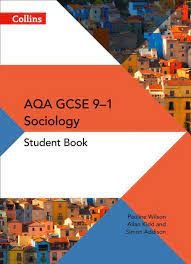
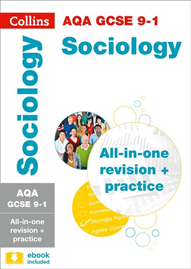
Students will be provided with a wide range of support materials available on their Google Classroom
What equipment is needed at GCSE?
A writing pen, highlighter, glue stick, pencil, purple biro and pink biro are essential at all times.
A Level
What will be studied?
In Year 12, the following topics are studied:
Education with Theory and Methods: In this unit we study the institution of education and how it shapes the lives of young people in the UK. We explore the role of education through sociological studies and methods. The education unit is explored in significantly more depth than at GCSE level.
Culture and Identity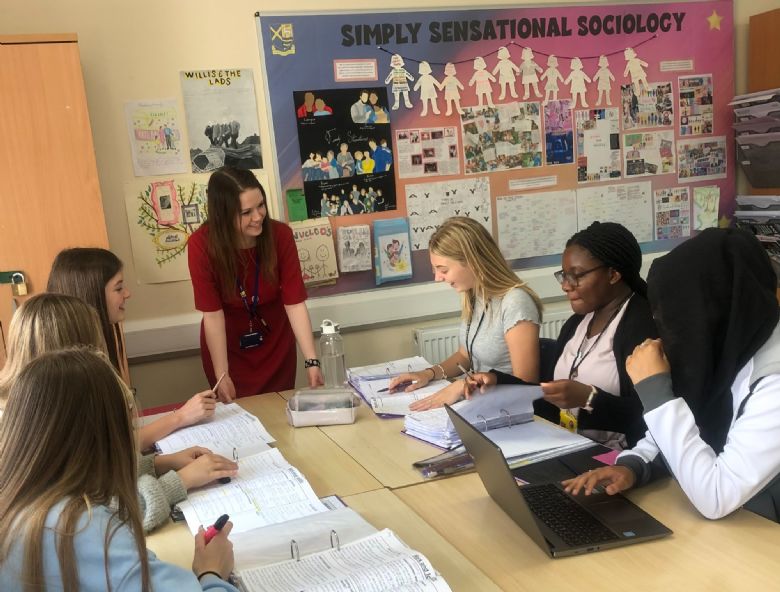 : In this unit we study different cultures and the influence identity has on our everyday lives. We study the socialisation process and examine the different agents of socialisation in depth (media, religion, family and peer groups).
: In this unit we study different cultures and the influence identity has on our everyday lives. We study the socialisation process and examine the different agents of socialisation in depth (media, religion, family and peer groups).
In Year 13 the following topics are studied:
Crime and Deviance with Theory and Methods: this unit explores how crimes are defined, why they are committed and who commits them. Deviance and cultural notions of what makes people deviant will also be explored. The theory and methods unit explores sociological theory and research methods, and encourages students to think analytically; for instance, an example of a debate from the theory section is is Sociology a Science?
The Media: students will study this topic in great detail. Who owns the media and how much influence does this have on our day to day lives? We study media representation of characteristics such as gender, sexuality, ethnicity and class. Students will also study theoretical aspects of the media and will be expected to make links to other areas of the specification.
A-Level Assessment:
There are three 2 hour exams at the end of the two year course. All exams consist of a mixture of short mark and long mark questions.
Paper 1: Education with Methods in Context
Paper 2: Culture and Identity and Media
Paper 3: Crime and Deviance with Theory and Methods
Expectations of students:
An awareness of current social issues and wider reading are necessary for optimum learning. It is essential to conduct independent reading and research to develop sociological knowledge. Lessons include formal teaching and note-taking as well as group work and Independent activities. Students will be expected to work with their peers to produce assignments and presentations, and to take part in sociological debates. As an essay-based subject, regular essay writing and exam practice is essential and non-negotiable.
Students should have good reasoning skills, a willingness to consider a range of views objectively, and the ability to think clearly about different kinds of information and how to interpret this information. Students need to have a genuine interest in controversial social issues and be willing to read widely.
Recommended support materials for A-Level students:
- Ken Browne AQA Volume 1 and 2 course textbooks
- Tutor2u Sociology
- The Teacher Sociology YouTube videos
- Sociology Review Magazine (available as a tile on students' RM unify)
- News apps websites such as the BBC, the Guardian, and Sky News
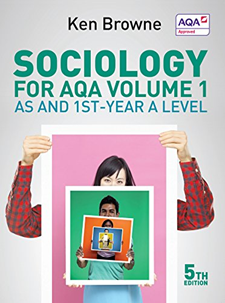
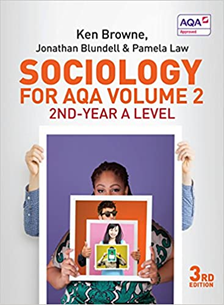
Students will also be provided with a wide range of support materials available on their Google Classroom.
What equipment is needed at A-Level?
A large lever arch folder with sectional dividers, writing pens, highlighters, a glue stick, a purple biro, a pink biro, and pencils are needed at all times.